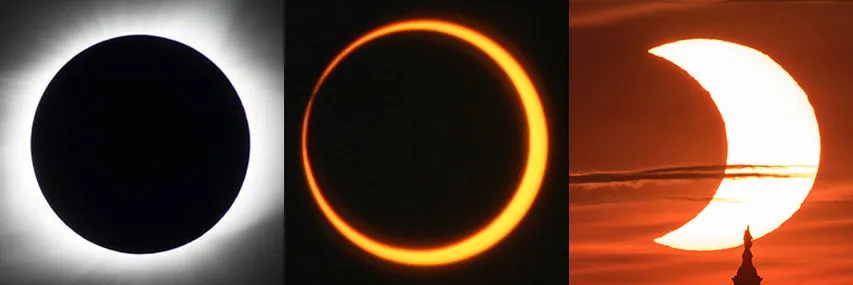What is a Solar Eclipse?
Have you ever made a shadow puppet by putting your hand over a flashlight in the dark? You may be surprised to learn that what you see (a big shadow on your wall) is very similar to what happens during a solar eclipse.
As the Moon orbits our planet, it sometimes comes between Earth and the Sun. And just like your hand over the flashlight, the Moon blocks the Sun’s light, causing a big shadow to fall over the surface of Earth.
This is what we call a solar eclipse!
Sometimes, the shadow is so dark it can turn daylight into a brief twilight.
Different Kinds of Solar Eclipses

Source: https://science.nasa.gov/eclipses/types/
Credit: Total eclipse (left): NASA/MSFC/Joseph Matus; annular eclipse (center): NASA/Bill Dunford; partial eclipse (right): NASA/Bill Ingalls
From left to right, these images show a total solar eclipse, annular solar eclipse, and partial solar eclipse. A hybrid eclipse appears as either a total or an annular eclipse (the left and middle images), depending on the observer’s location.
Total Solar Eclipse: A Nighttime Adventure
When the Moon aligns perfectly with the Earth and Sun, it’s showtime for a total solar eclipse! For a few magical minutes, it becomes dark as night during the day, and we can see the Sun’s glowing halo, or corona: a sight we usually can’t see because the Sun is too bright.
Annular Solar Eclipse: The Ring of Fire
“Annular” comes from “ring.” Sometimes, the Moon is far away and looks smaller, so it doesn’t cover the Sun completely. Instead, it leaves a bright, fiery ring around its edges. It’s like the Sun is wearing a glowing crown!
Partial Solar Eclipse: The Sun's Crescent Smile
During a partial solar eclipse, the Moon takes a bite out of the Sun, and we see the Sun as a crescent, similar to the Moon’s phases. It’s as if the Sun is smiling at us with a crescent smile!
How Often Do Solar Eclipses Happen?
Solar eclipses happen a few times a year, but a total solar eclipse (where day turns dark as night), is a rare and special show that happens about once every 18 months somewhere on Earth.
The catch? You need to be in the right place at the right time to see it! During any solar eclipse, not everyone on Earth will be perfectly lined up to the eclipse’s path.
Sometimes, it can be hundreds of years until one area on Earth will get a total solar eclipse again.
Wondering When the Last Total Solar Eclipse Was in Canada?
The total solar eclipse on April 8, 2024 has caused a lot of excitement because the last time the path of a total solar eclipse crossed Canada was in 1979!
The Next Total Solar Eclipse in Canada Isn’t Exactly Coming Soon
The next time Canadians will be able to see a total solar eclipse will be in August of 2044.
How to Watch a Solar Eclipse Safely
Staring at the Sun can hurt your eyes, even during an eclipse. Watching an eclipse directly with your eyes, with regular sunglasses or even through a cell phone/camera is incredibly dangerous.
But while this amazing natural phenomena deserves caution – there are lots of ways that you can watch an eclipse safely!
Solar Eclipse Glasses

One popular option is to purchase special solar eclipse glasses. To find eclipse eyewear that meets the right safety requirements, you/your parents can look on the American Astronomical Society’s list of suppliers, which includes options in Canada.
Pinhole Projector

You actually don’t need to spend any money, or use a lot of fancy equipment to safely watch a solar eclipse from home.
With just:
- An empty cardboard box (the longer it is, the larger the image of the Sun)
- White paper
- Scissors
- Aluminium foil
- A pin
- Tape
You can make a pinhole projector!
Get the instructions on how to make a pinhole projector from the Canadian Space Agency’s website now.
NASA Live Stream of the Eclipse
Sadly, pesky clouds have a way of rolling in at the wrong time for people who are hoping to see an awesome eclipse.
Luckily, NASA set up a live stream. So no matter where you are, as long as you have an internet connection, you can safely view the total solar eclipse.
Solar vs. Lunar Eclipse: What's the Difference?
While we’ve been talking about solar eclipses, you may have also heard the term ‘lunar eclipse’ too. This event is similar to a solar eclipse, with one key difference.
Think of the Earth, Moon, and Sun as actors on a stage. During a solar eclipse, the Moon jumps between the Earth and Sun, blocking the Sun’s light.
In a lunar eclipse, it’s Earth’s turn to get between the Sun and Moon, casting a shadow on the Moon. Sometimes, during a lunar eclipse, the Moon can even turn a spooky red colour, as if it’s wearing a red cape!
In Conclusion
Solar eclipses are truly spectacular celestial events that captivate both scientists and enthusiasts alike. They also offer moments of cultural significance and communal excitement. They inspire curiosity, spark wonder, and foster a deeper appreciation for the intricacies of our solar system. So, whether you’re gazing up at the sky with eclipse glasses or crafting a pinhole projector, let the magic of these celestial events ignite your imagination and deepen your connection to the cosmos.




